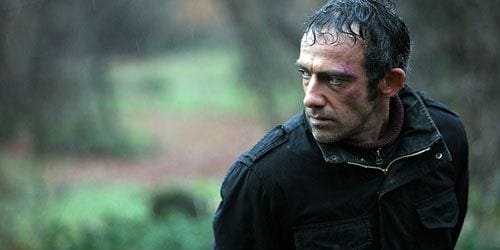
The Hunter opens on a grainy photo of men. At first it’s hard to tell who they might be, as the focus is so close that they have no context. But as the camera pulls back, slowly and over a series of cuts, you see these pieces of arms and legs and angry faces form full figures. They stare into the camera, seated on motorcycles, a large US flag painted on the pavement that stretches into the foreground.
This stark, unexplained image cuts to the film’s title and then to a car, speeding through a dimly lit tunnel, away from the camera, and then a man alone, in the woods, cleaning and cocking a rifle. This is Ali (played by writer-director Rafi Pitts), and his aloneness on this grey afternoon is striking. He sits before a large rock, leafless trees and outsized foliage all around, until yet another cut, to a nighttime scene, a campfire blazing while he waits and watches. It’s not clear what Ali is hunting, only that he is.
Back in Tehran, he lives in a small apartment in a bleak complex with his wife his wife, Sara (Mitra Hajjar), and six-year-old Saba (Saba Yaghoobi). He works as a security guard at night, pacing the empty aisles of a warehouse, looking as small in this interior as he does in the huge woods. He wears a blue uniform and a hat that looks outsized atop his narrow face and frame. He speaks only briefly in these early scenes, during an interview with his employer, who informs him, “With your experience, you can’t expect the day shift. You should thank God you have a job.”
That experience is left to your imagination, save for the key point that Ali has been in prison. Now that he’s released, he wants to see his wife and daughter, he says, and the late hours make that difficult. This is important to him: when he does spend time with Sara and Saba, Ali is visibly changed. Grim and forlorn when he’s alone, with his family he actually smiles: they make their way through crowds on the sidewalk, they visit a playground where Saba sits in a room full of colored balls and other children, her face bright and mirroring the pleasure on her parents’ faces, observed through the cage-like wall of the balls’ pen.
Apart from his family, Ali doesn’t spend much time with other people, a scene or two with his fellow watchmen, another in a late night café, where he eats before his shift. Here and when he’s driving — which he does frequently, to and from the woods — Ali hears state radio broadcasts, mostly news of the upcoming 2009 elections in Iran. That these elections are now notoriously disputed, and now seem to portend last year’s “Arab Spring,” at least in broad outlines, makes the transmissions here sound both abstract and concrete. In one familiar piece, Ali Khamenei rebuffs President Obama’s recent message to Iran, saying, ” If they are extending an iron hand concealed in a velvet glove, then it has no positive meaning.”
As such rhetoric lays out the nation’s isolation and distrust of the world around it — specifically, the West — it also speaks to Ali’s isolation. He sits at the café counter, far from the camera, as you hear another news clip, a reporter asking, “Will you vote in this election?” The interviewee’s response is cryptic — “Do you really want to know?” — perhaps suggesting the increasing suspicion of authorities in media and government, perhaps the developing resistance to business as usual.
Ali’s forbidding expression doesn’t change during these moments: he may or may not be listening. But you make connections between his desperation and the lack of options in Iran, so that his escape to the woods seem less ritual than emotional, less demonstrations of some masculine stoicism than desolate efforts to pull himself together, to survive in an environment that has “no positive meaning.”
When violent tragedy strikes (Sara is killed in “crossfire” between police and protestors), Ali is left even more alone, more desolate. He drives, he waits, and grows increasingly frustrated by authorities’ inaction as he tries to find the missing Saba. After visits to hospitals and morgues and repeated vigils in police station hallways, he turns on the police, imprecise emblems of What’s Wrong, actually hunting them from mountaintops and doing his best to remain unseen.
Ali is soon enough captured by two military policemen, a furious lifer (Ali Nicksaulat) and the younger Nazem (Gholamreza Rajabzadeh), who explains that his uniform “isn’t my choice.” Wide, melancholy shots show the trio wandering under a dreary sky, shuffling through brown leaves and dirt, lost as the city-based officers have no sense of where they are. Eventually, a barrage of rain leaves all three men looking entirely bereft.
As unsympathetic as the officers may be, their prisoner’s silence, along with repeated close-ups of his dismal face, helps you to understand their sense of vexation. Ali can’t articulate his methodical but also irrational resistance, or even whether he’s thought through his campaign. But The Hunter illustrates — in harrowing, haunting shots of the woods, the rain, the car speeding along the roadway — how he feels.

![Call for Papers: All Things Reconsidered [MUSIC] May-August 2024](https://www.popmatters.com/wp-content/uploads/2024/04/all-things-reconsidered-call-music-may-2024-720x380.jpg)



